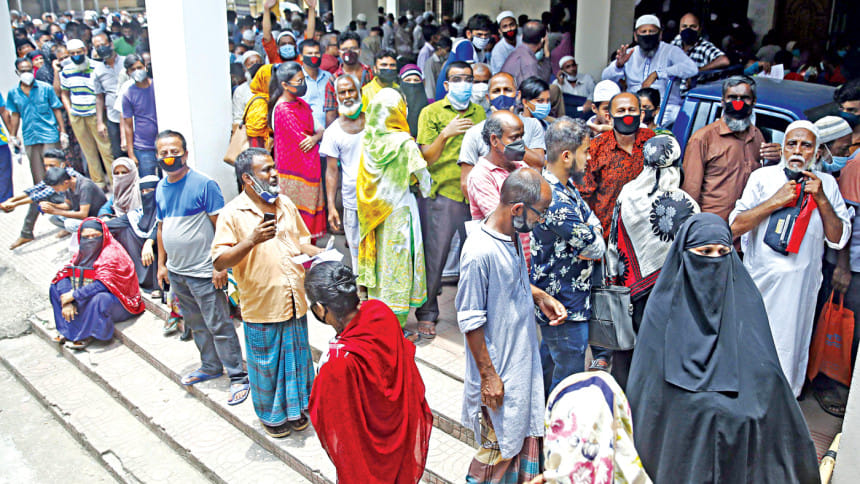IEDCR Survey in Dhaka: 45pc carrying coronavirus antibody

Around 45 percent of the people, covered by a survey in the capital, were found to be carrying Covid-19 antibody, according to a study by the Institute of Epidemiology, Disease Control and Research.
The presence of such antibody among slum dwellers was much higher -- about 74 percent, mentions the study based on data collected between April 18 and July 5 this year.
A total of 3,227 households across the capital were surveyed under the study jointly conducted by the IEDCR and the International Centre for Diarrhoeal Disease Research, Bangladesh (icddr,b).
The Bill and Melinda Gates Foundation and the USAID supported the first-ever cross-sectional epidemiological survey in Bangladesh. A summary of the survey was published on August 10.

"The encouraging rate of seropositivity among the population surveyed in Dhaka city indicates that we have started developing herd immunity against the novel coronavirus," Dr Ferdausi Qadri, senior scientist at the icddr,b, said at the launch of the study report in the capital.
The findings come at a time when a number of countries have already been hit by the second wave of the novel coronavirus.
Researchers said this information will be helpful in transmission control, treatment of the infected people and also vaccination.
During the survey, samples of 12,699 individuals from 25 wards in Dhaka city were tested through the rt-PCR method, and 9.8 percent or nearly one in 10 people was found positive for Covid-19.
Of the infected people, 24 percent were above 60 and 18 percent between 15 and 19.
And 82 percent of the Covid-19 cases were asymptomatic, which means most of the carriers of the virus show no symptoms despite being infected with the virus, researchers said.
They also found some incidents of second-time infection during the survey.
Genome sequencing of 67 novel coronavirus strains was completed and compared with 325 sequenced data available in Bangladesh.
IEDCR Director Prof Tahmina Shirin presented this part of the study.
The major findings of genome sequencing are that the first transmission of the novel coronavirus in Bangladesh happened in mid-February this year and the main one in March when people left the capital in droves following the shutdown.
Besides, lineages circulating in Bangladesh are closely related to those circulating globally, suggesting that therapeutics and vaccines would be as effective in Bangladesh as elsewhere in the world.
The mutation of the virus in Bangladesh is closely consistent with the global trend, the study said.
"The findings suggest that therapeutics and vaccines, which are becoming available globally, will be effective in Bangladesh," Prof Tahmina said during her presentation.
Prof Meerjady Sabrina Flora, additional director general of the health directorate, said, "Wearing masks and maintaining health rules are the best way to stay safe from Covid-19."
Health Minister Zahid Maleque, Mission Director of USAID Derrick S Brown, Acting Executive Director of icddr,b Dr Tahmeed Ahmed, and President of the National Advisory Committee on Covid-19 Dr Mohammad Shahidullah, joined the event online.
31 MORE DIE
Thirty-one people died from Covid-19 in the country within 24 hours till yesterday evening, according to the Directorate General of Health Services (DGHS).
During the period, 13,227 samples were tested all over the country, and 1,472 of those were found positive for the virus, taking the total number of Covid patients to 379,738.
The number of deaths from the virus now stands at 5,555 with a death rate of 1.46 percent, shows DGHS data.
Meanwhile, 1,531 Covid-19 patients recovered in 24 hours till yesterday evening, raising the number of recoveries to 294,391. The recovery rate is now 77.52 percent.

 For all latest news, follow The Daily Star's Google News channel.
For all latest news, follow The Daily Star's Google News channel. 



Comments